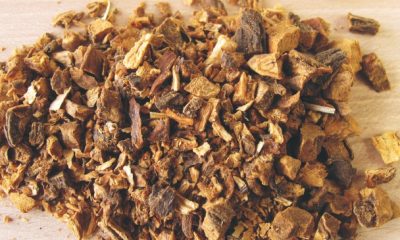Health
7 Benefits of Epazote and side effects

Table of Contents
Discover the 7 shocking health benefits of Epazote and side effects.
Epazote, also known as paico or acahualillo, is a widely used medicinal plant, as its essential oils contain vermifuge, antibiotic, digestive properties, and strengthen the immune system.
This plant, whose scientific name is Chenopodium Ambrosioides, grows spontaneously in lands that surround the houses, it has elongated leaves of different sizes and dark green, its flowers are small and whitish.
Epazote can be bought in certain markets or health food stores, in its natural form, in dehydrated leaves, or essential oil.
Because it is considered a plant with a degree of toxicity, it should preferably be used under the guidance of a health professional, in addition to the use of tea from its leaves instead of essential oil, since it contains a higher concentration of potentially toxic substances.
Health Benefits of Epazote
Although epazote is a plant that is widely used in traditional medicine, it has few studies that confirm its properties in the body.
Despite this, several investigations have been carried out with this plant in animals, concluding that it has effects such as:
1. Eliminate intestinal parasites
This is one of the most popular uses of epazote and, according to some human studies, the use of this plant has a strong action against different intestinal parasites, such as worms and tapeworms.
This action seems to be related to the main active substance in epazote, ascaridol, which is similar in efficacy to some antiparasitic drugs, such as Albendazole.
2. Benefits of epazote for immune system
According to research carried out in animals, the use of epazote extract seems to be able to regulate the production of some cells important for the body’s defense, such as macrophages and lymphocytes, strengthening the immune system.
The mixture of epazote leaves with milk is popularly used to help in the treatment of respiratory diseases, such as bronchitis and tuberculosis, due to the union of the strengthening effects of the immune system and expectorants that these substances possess.
Another common use of epazote is in the relief of inflammation, mainly joint problems, such as osteoarthritis. Additionally, the plant also helps relieve pain from inflammation.
This analgesic action was observed in the use of the alcoholic extract of the plant, which seems to act on the NMDA receptors.
4. Benefits of epazote for digestion
Although there are no studies that prove the action of this plant on poor digestion, this is one of the popular uses in which it is used the most.
According to its use, epazote tea can be taken after large meals, to improve digestion, as it could be able to increase gastric juice production.
5. Benefits of epazote for blood pressure
In Morocco, epazote is frequently used to help treat high blood pressure and, according to studies in mice, this property is due to the stimulation of type 2 muscarinic receptors in the heart that slightly decrease the heart rate. , in addition to relaxing the heart muscle.
6. Combat bacterial, viral, and fungal infections
Both the use of epazote extract and essential oil has shown a powerful antimicrobial action that is capable of eliminating various types of bacteria, viruses, and fungi.
7. Avoid osteoporosis
In some investigations carried out in laboratory mice, the use of the hydroalcoholic extract of epazote was able to prevent the loss of bone density and can be applied to prevent the onset of osteoporosis, especially in women who are close to entering menopause.
Is epazote used to treat coronavirus?
A study carried out in 2020 by the Oswaldo Cruz Institute, confirmed the hypothesis that the flavonoids present in epazote may be able to prevent the replication of the new coronavirus, accelerating the recovery and cure of COVID-19.
However, the study was conducted on a computer model and has not been tested in a laboratory, nor living organisms.
For this reason, the dose necessary for treatment is not known, nor are the possible side effects.
For this reason, no health organ recommends the use of epazote as a treatment for COVID-19 until new studies are carried out.
How to use epazote
The most common way to take advantage of the properties of this plant is by infusing its leaves, preparing a tea:
Epazote tea: place a cup of the fresh plant with the seeds in boiling water and let it rest for 10 minutes. Afterward, strain and drink a cup up to 3 times a day.
In addition to infusion, another popular way to use epazote is an essential oil, however, its use must be guided by a naturopath, psychotherapist, or a health professional with experience in the use of medicinal plants.
How to Make epazote tea
Ingredients
8 large stems and leaves of fresh epazote
2 quarts boiling water
Procedure
- Add epazote to boiling water and let simmer for 2 minutes.
- ove from heat and let steep for another 3 minutes.
- Strain and serve.
Side effects of epazote include irritation of the skin and mucous membranes, headache, vomiting, nausea, palpitations, damage to the liver or kidneys, visual disturbances, and seizures, in case of doses higher than recommended or for a time. longer than 3 days in a row.
Is epazote abortifacient?
In high doses, the properties of epazote can act by altering the contractility of the body’s muscles; For this reason, it can have an abortive effect in certain people, not advising its use in pregnant women.
Contraindications
Epazote is contraindicated in pregnant women and children under 2 years of age.
This medicinal herb can be toxic, requiring a medical indication to establish the recommended dose
Health
15 good reasons to drink lemon juice in the morning on an empty stomach

Discover the 15 good reasons to drink lemon juice in the morning on an empty stomach.
Lemon is one of the most frequently and widely used citrus fruits.
Its popularity is due to its scent and refreshing taste.
Its aroma makes it an ingredient of choice in many recipes and the composition of perfumes.
It also accompanies a large number of drinks, including tea and cocktails, it can also be served as fruit juice.
Not only is lemon used for its aromatic qualities, but also its therapeutic dimension.
Rich in vitamin C, lemon indeed has formidable therapeutic virtues: its Antiviral and antibacterial properties as well as its ability to stimulate the immune system are widely recognized.
One of the most common ways to reap the benefits of lemon is by squeezing the juice.
Lemon juice stimulates digestion and has a detoxifying action.
It also promotes drainage of the liver and thus improves digestion.
By its ability to boost metabolism, lemon juice is an effective way to lose weight.
If you want to lose weight, drinking lemon juice in lukewarm water every morning on an empty stomach gives fabulous results.
But that’s not all, nutrition specialists at the Edison Institute of Nutrition have compiled a list of the main benefits of consuming lemon juice mixed with lukewarm water on an empty stomach:
1. An excellent source of vitamin C, lemon juice protects the body by strengthening the immune system.
2. Drinking lemon juice in lukewarm water every morning on an empty stomach helps maintain pH balance in the body.
3. Thanks to its antibacterial properties, lemon juice helps fight infections.
4. Has a detoxifying action.
5. Promotes digestion.
6. Besides vitamin C, lemon is also an excellent source of potassium, calcium, phosphorus, magnesium, etc.
7. Helps fight colds.
8. Lemon water is a well-known remedy for dealing with different skin problems like acne, rashes, wrinkles, or dark spots.
9. Mixed with lukewarm water, lemon juice stimulates digestion, boosts metabolism, and thus allows you to lose weight quickly.
10 Lemon juice is also very effective in removing toxins that have accumulated in the liver.
11. The anti-inflammatory properties of lemon help fight infections of the respiratory tract, sore throat, and inflammation of the tonsils.
12. Rich in electrolytes, lemon juice effectively hydrates the body.
13. Drinking lemon juice mixed with lukewarm water decreases muscle and joint pain.
14. Lemon juice in lukewarm water promotes good dental hygiene because it helps decrease dental pain and prevent gingivitis.
15. Drinking lemon juice in lukewarm water stimulates digestion and regulates intestinal transit.
SOME QUESTIONS / ANSWERS AND COMMENTS :
Q. Out of curiosity… my cousin is allergic to lemon. Does lime have the same virtues?
A. Yes, you can substitute lemon for lime.
I had to stop drinking lemon water for a month because I was sick. The joint pain I got rid of before all came back.
So I started drinking lemon juice in lukewarm water again every morning on an empty stomach.
Now after a week, and it’s true, my pain in my knees is gone !!!!
It’s amazing! Lemon is indeed very alkalizing and promotes the elimination of acids.
Also, it contains a lot of vitamin C, which is good for the joints.
Some people suffer from vitamin C deficiency and need to be sure to find it in their diet or supplements.
Q. After drinking lemon juice in lukewarm water in the morning on an empty stomach, how long should I wait to eat?
A. I recommend that you wait 20 to 30 minutes before eating.
Q. Why does lemon juice need to be mixed with lukewarm water? Is lemon juice also beneficial in cold water?
A. Lukewarm water stimulates digestion and the liver.
Coldwater does the opposite, it blocks digestion.
So it is best to consume lemon juice in lukewarm water.
Q. How many lemons should you squeeze in the morning to benefit from the benefits of this fruit?
A. I suggest squeezing half a lemon in a large glass of lukewarm water (25cl).
Lemon juice is rich in vitamin C and antioxidants.
Citric acid and vitamin C promote the dissolution of gallstones, their elimination, as well as the clearing of the bile ducts.
Lemon juice has been used for centuries in the treatment of kidney stones and gallstones.
Lemon also has antimicrobial properties that help reduce gallbladder infections and relieve pain.
The pectin in lemon juice relieves bloating, nausea and pain.
Besides, lemon juice helps reduce the production of cholesterol by the liver.
Q. Hello. I have a question: I have thyroid problems, can I drink lemon juice in lukewarm water?
A. Yes. You can drink lemon juice in lukewarm water if you are suffering from thyroid problems.
Q. I take medicine on an empty stomach every morning for a thyroid problem. Should I take this medicine before drinking lemon water or after?
A. Since lemon water is absorbed relatively quickly by the body, I recommend that you take your medicine soon after drinking the lemon water.
Joint pain is associated with poor digestion and allergic reactions to certain foods.
Lemon water promotes digestion and the elimination of toxins.
If your teeth are prone to demineralization and are very sensitive, I advise you to drink lemon water through a straw.
Health
3 Benefits of salt water and side effects

Discover the 3 shocking health benefits of salt water and side effects.
Sometimes the best remedies in life are the simplest. This is true of an ancient skincare hack known for tightening pores, balancing oil production, and rejuvenating skin.
You won’t need fancy skin creams packed with chemicals and preservatives to achieve a youthful glow after this.
You can start to improve the quality of your skin with just two things: purified water and high-quality salt, and you will see how the benefits of saltwater will work miracles for you.
Health Benefits of saltwater
Since saltwater therapy has been used for centuries throughout the world, including ancient Greece, there is strong anecdotal evidence that it works wonders on the skin.
A handful of studies have found the saltwater bath to be particularly effective for troublesome skin conditions, such as psoriasis.
Saltwater is said to benefit your skin in the following eleven ways:
• Closes open pores
• Absorbs excess oil
• Balances oil production
• Kills acne-causing bacteria
• Diminish scars
• Heals scratches and cuts
• Exfoliates dead skin cells
• Restores the natural pH of the skin
• Improves the barrier function of the skin
• Improves hydration
• Reduces inflammation
1.- Benefits of salt water for acne
If you are lucky enough to live near the ocean, you may already know this beauty secret.
But if you don’t live on the coast, just fan warm salt water the next time you have an outbreak.
Try mixing a cup of purified water with a tablespoon of sea salt.
Use a cotton ball to gently apply saltwater to acne and allow it to dry.
By the way, if you try this treatment and your acne still isn’t clearing up within a day or two, maybe your diet is to blame.
Make sure to avoid sugar, processed junk, gluten, peanuts, yeast, and dairy for a while to see if your skin clears up.
Eat plenty of green leafy vegetables, lean protein sources, and healthy fats like coconut oil and avocados; your skin and waist will thank you.
2.- Benefits of salt water for scratches
If you’ve ever heard the expression “throwing salt on a wound,” you probably aren’t very interested in putting salt water near your scratches.
However, this treatment can be beneficial in killing harmful bacteria and speeding up the healing process.
Research shows that bathing in magnesium-rich Dead Sea salt improves the skin’s barrier function, improves skin hydration, and reduces skin inflammation, which are all the things you’ll need if you have a cut or scratch.
Fill your bathtub with warm water and pour in a cup of sea salt.
Take the experience to the next level by adding 10 drops of lavender essential oil.
The scent will promote a deep sense of relaxation – you may even feel like you are in a spa!
3.- Drink salt water to heal from the inside out
The good thing about salt water is that there are many ways to use it. A glass of warm salt water, called “Sole,” is a great way to start your day and promote internal healing.
As long as you use a natural form of salt (and avoid drinking seawater), it will promote hydration, facilitate digestion, reduce inflammation, improve your sleep, detoxify your cells, improve your bone health, and more.
What does salt do to the body
We rarely think about what goes into nature’s most common treasures, like salt.
This natural mineral comes directly from the earth, formed into crystals from a combination of sodium and chloride.
It is found naturally in seawater, making up at least three percent of our world’s oceans. And when seawater is trapped, the water evaporates and leaves salt crystals.
Despite what you may have heard about sodium and your health, a natural source of salt contains vital nutrients that are important for maintaining optimal well-being.
First, salt provides key minerals like sulfur, calcium, sodium, magnesium, silicon, boron, potassium, bromine, and strontium.
With its rich mineral content, salt can help you lose weight, reduce asthma symptoms, improve blood sugar levels, and regulate heart health.
However, keep in mind that not all salts are created equal. Table salt, for example, is highly processed and bleached before it reaches that little glass bottle.
Unfortunately, during mass production, manufacturers strip you of everything good for your health.
The result is a product that does not resemble its original form and can even harm your health. When doctors warn against consuming too much salt, table salt is what they mean.
For your skincare routine and general health, try using these unprocessed varieties:
Sea salt for skin
Natural sea salt contains the many minerals our bodies need, such as magnesium, calcium, sodium, and potassium.
All of these play a role in the health of our skin, allowing cells to communicate with each other and heal problems that arise.
When you don’t have enough minerals, you will see annoying symptoms like dry skin, dullness, irritation, and blemishes.
Fortunately, sea salt can naturally enhance hydration and strengthen the outer layer of your skin to keep it looking healthy.
Himalayan pink salt for skin
Despite the name, there are no salt mines in the Himalayas. The pink salt slabs come from the Khewra Salt Mine in Pakistan, about 300 miles west of the Himalayas.
As the second-largest salt mine in the world, people have been collecting this commodity for more than 2,000 years.
Only in the last decade has it become popular in Western culture. Salt is made up of 95 percent sodium chloride.
The rest is a mixture of polyhalite and other minerals, which give the salt its characteristic pinkish hue.
Due to the lack of processing, it still contains the beneficial minerals that your skin will love.
As you can see, saltwater provide a series of skincare benefits, so if you want to show off shiny and well-groomed skin, do not hesitate to follow each of the tips in this publication step by step.
Health
12 Benefits of Jamaica flower and side effects

Table of Contents
-

 Benefits4 months ago
Benefits4 months agoThe Benefits of Joining Gym Lumolog – Improve Your Fitness & Health
-

 Food1 year ago
Food1 year ago10 + Benefits of carrot juice and side effects
-

 Health1 year ago
Health1 year ago50 Super Healthy (And Very Often Cheap) Foods
-

 Health1 year ago
Health1 year ago5 Shocking health benefits of kinkeliba and side effects
-

 Food1 year ago
Food1 year ago8 shocking benefits of leek juice and side effects
-

 Health1 year ago
Health1 year ago15 health benefits of soursop leaves tea and side effects
-

 Health1 year ago
Health1 year ago15 Benefits of lipton tea and side effects
-

 Health1 year ago
Health1 year agoBenefits of guava leaves Sensually












